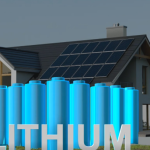
What is the Difference Between IP21 and IP65 Inverters?
December 4, 2024
How Many Hours of Backup Can I Get from a Lithium Battery?
February 10, 2026Lithium-ion batteries are becoming increasingly popular worldwide and have become game-changers in many industries. From powering electric vehicles to storing energy for solar panels, lithium-ion batteries are transforming how we think about energy storage. In Pakistan, where power outages are common and solar energy is gaining traction, these batteries are particularly important. But what makes lithium-ion batteries the new big thing?
What Are Lithium-Ion Batteries?
Lithium-ion batteries are a type of rechargeable battery. They are widely used in mobile phones, laptops, electric cars, and solar energy systems. These batteries have a high energy density, which means they can store a lot of energy in a small and lightweight form. This makes them ideal for portable devices and large-scale energy storage solutions.
Lithium-Ion Batteries in Solar Energy
In Pakistan, where the electricity supply can be unreliable, many households and businesses turn to solar power as an alternative energy source. Lithium-ion batteries store energy produced during the day for use at night or during power outages to make solar energy more effective. This is where lithium-ion solar batteries in Pakistan come into play. They help people reduce their reliance on the grid and ensure a continuous power supply.
Why Lithium-Ion Batteries Are the Future?
There are several reasons why lithium-ion batteries are seen as the future of energy storage and usage. Let’s explore the key benefits.
High Efficiency
One of the main reasons lithium-ion batteries are gaining popularity is their efficiency. They can store a lot of energy relative to their size and weight, making them more practical than other types of batteries. This high energy density allows for longer-lasting energy storage, especially for solar systems in homes and businesses.
Long Lifespan
Lithium-ion batteries last longer than traditional lead-acid batteries. While lead-acid batteries may only last 3 to 5 years, lithium-ion batteries can last anywhere from 10 to 15 years with proper maintenance. This long lifespan means that people get more value for their money in the long run.
Faster Charging
Another advantage of lithium-ion batteries is their ability to charge faster than other types of batteries. This is especially useful for solar energy systems, where energy storage needs to happen quickly during daylight hours. Faster charging also helps electric vehicles, making lithium-ion batteries an essential component of the electric vehicle revolution.
Low Maintenance
Lithium-ion batteries require less maintenance compared to traditional batteries. Lead-acid batteries need regular checking of fluid levels and equalization charging, but lithium-ion batteries are more straightforward. This ease of use makes them an attractive option for both residential and commercial users in Pakistan.
Lithium-Ion Battery Price in Pakistan
One concern when adopting new technology is the cost. The lithium-ion battery price in Pakistan is relatively higher than that of traditional batteries. However, due to technological advances and increased manufacturing, the cost of these batteries has decreased over time. While the initial investment might seem steep, the long-term benefits, such as a longer lifespan and lower maintenance costs, make lithium-ion batteries a smart choice for many.
Moreover, the increasing availability of solar power systems in Pakistan is helping reduce installation costs, making it easier for homeowners and businesses to adopt solar energy solutions with lithium-ion batteries. As more people adopt this technology, the prices will continue to decrease.
The Role of Lithium-Ion Batteries in Pakistan’s Energy Future
In Pakistan, where power shortages and load shedding are common, lithium-ion batteries are helping provide a reliable backup power source. Solar energy is also gaining popularity as an alternative to the national grid. With lithium-ion solar batteries in Pakistan, individuals can store excess energy generated by their solar panels during the day, ensuring they have power at night or during outages.This solution is especially beneficial for businesses that rely on continuous power supply. The ability to store energy and use it during peak demand times or when the grid fails can save businesses significant money and improve productivity.
Benefits of Lithium-Ion Batteries for Homes and Businesses
For homes, lithium-ion batteries offer a reliable power backup during load shedding and allow solar energy users to save on electricity bills. These batteries can also provide businesses with an uninterrupted power supply, ensuring that operations continue smoothly without interruptions. The combination of solar power and lithium-ion batteries is helping Pakistan move toward more sustainable and cost-effective energy solutions.
Read more: Step-by-Step Guide on How Solar Panels Are Installed
An ending:
Lithium-ion batteries are changing the way we store and use energy. Their high efficiency, long lifespan, low maintenance, and environmental benefits make them an attractive option for residential and commercial energy solutions.
While the price of lithium-ion batteries in Pakistan is still higher than that of traditional batteries, the long-term savings and benefits outweigh the initial cost. Lithium-ion batteries are critical to Pakistan’s future energy needs due to the increasing demand for renewable energy sources like solar power.
At Max Power, we specialize in providing high-quality solar solutions, including lithium-ion solar batteries in Pakistan. Whether you’re looking to reduce your energy bills or ensure a steady power supply during outages, we have the perfect solution. Contact us today to learn how we can help you switch to solar energy and benefit from the latest battery technology!




